El papel del FMI para la protección social: prometedores cambios en políticas y desafíos persistentes
DOI:
https://doi.org/10.24215/25251678e486Resumen
Se puede afirmar que el Fondo Monetario Internacional (FMI) ha cambiado su postura sobre la protección social, entendida como el conjunto de medidas públicas destinadas a proteger a la población de los peligros sociales y económicos en caso de reducción o pérdida de ingresos. Desde los más altos cargos del FMI, se ha afirmado que se produjo un cambio en el foco de su atención: de una concentración excesiva en ajustes estructurales, con frecuencia muy criticada, a un “nuevo” abordaje e interés en las cuestiones sociales a través del prisma de la “macrocrítica”. En el presente artículo, se estudia la evolución y el alcance de este aparente cambio, dada la importancia del papel del FMI en la protección social: las recomendaciones macroeconómicas del organismo tienen una influencia decisiva sobre las decisiones de políticas a nivel nacional en relación con la protección social, mediante mecanismos como las recomendaciones y experiencia de vigilancia, las condicionalidades sobre préstamos y el papel del FMI como facilitador ante préstamos a terceros. También se analiza la respuesta del FMI a la crisis económica originada por la pandemia de la COVID-19 a fin de evaluar hasta qué punto se han modificado sus políticas en la realidad. Mostramos que, si bien se han concretado algunos cambios promete- dores en las políticas, entre ellas, la reducción y hasta eliminación de algunas condicionalidades y la promoción de inversiones en el sector salud, la insistencia en medidas selectivas para combatir la pobreza, en lugar del fomento de pisos de protección social universales, así como el enfoque persistente en la sustentabilidad fiscal, condujeron a un abordaje ambiguo que menoscaba los avances en pos de hacer de la protección social un recurso universal, tal y como se comprometieron los gobiernos en la Recomendación 202 de la OIT (2012). Prevalece un marcado contraste entre, de un lado, los esfuerzos desplegados para satisfacer las necesidades de financiamiento de los países, y del otro, la imposición de condicionalidades en nombre de la sustentabilidad fiscal. El FMI debe adoptar un enfoque de la protección social basado en los derechos humanos, que supere su tradicional insistencia en medidas selectivas en pos de la universalidad, de manera que se logre avanzar más allá de la mitigación de los efectos de sus programas sobre secto- res vulnerables. Un primer paso en esta dirección sería incrementar la cooperación con otras organizaciones internacionales, no solo el Banco Mundial, sino también UNICEF y la OIT, así como incorporarse a los esfuerzos existentes para el establecimiento de un Fondo Global para la Protección Social.
Referencias
Alston, Philip (2018). Informe del Relator Especial sobre la extrema pobreza y los derechos humanos, “The International Monetary Fund and its Impact on Social Protection”, párrafo 56 Disponible en inglés en: https://srpoverty.org/wp-content/uploads/2018/08/international-monetary-fund-impact-on-social-protection-2018.pdf
AlstonPhilip (2018). Informe del Relator Especial de las Naciones Unidas sobre la pobreza extrema y los de- rechos humanos, “Privatización”. Disponible en español y otros idiomas en: https://undocs.org/A/73/396.
Alston, Philip (2018). Informe del Relator Especial sobre la extrema pobreza y los derechos humanos, “The International Monetary Fund and its Impact on Social Protection”. Disponible en inglés en: https://srpoverty.org/wp-content/uploads/2018/08/international-monetary-fund-impact-on-social-protection-2018.pdf
Berg, Andrew; Ostry, Jonathan D. y Tsangarides; Charalambos G. (2017). “Redistribution, Inequa- lity, and Growth”. Notas de discusión del personal funcionario del FMI (IMF Staff Discussion Note), . Disponible en inglés en: https://www.imf.org/external/pubs/ft/sdn/2014/sdn1402.pdf.
Clementes, Benedict; GuptaSanjeev y Nozaki Masahiro. (2011). “What Happens to Social Spending in IMF-supported programmes?”. Notas de discusión entre funcionarios del FMI (IMF Staff Discussion Note), (2011), 16. Disponible en inglés en: https://www.imf.org/external/pubs/ft/sdn/2011/sdn1115.pdf
CLÍNICA SOBRE ORGANIZACIONES INTERNACIONALES EN LA FACULTAD DE DERECHO DE LA UNIVERSIDAD DE NUEVA YORK (INTERNATIONAL ORGANIZATIONS CLINIC AT NYU SCHOOL OF LAW) (2018). “IMF and Social Protection”, 16-17, 48. En una declaración basada en las entrevistas al personal funcionario del FMI se lee: “Un miembro del personal funcionario observó que prácticamente cualquier asunto de un país puede ser macrocrítico”. Disponible en inglés en: https://www.iilj.org/wp-content/uploads/2018/06/The-IMF-and-Social-Protection-NYU-IO-Clinic-Fall-2017.pdf
CLÍNICA SOBRE ORGANIZACIONES INTERNACIONALES EN LA FACULTAD DE DERECHO DE LA UNIVERSIDAD DE NUEVA YORK (International Organizations Clinic at NYU School of Law) (2018). “IMF and Social Protection”. Disponible en inglés en: https://www.iilj.org/wp-content/uploads/2018/06/The-IMF-and-Social-Protection-NYU-IO-Clinic-Fall-2017.pdf.
Coady , David y Nghia-Piotr Le, 2020, Designing Fiscal Redistribution: The Role of Universal and Targeted Transfers. Documento de trabajo del FMI. Disponible en inglés en: https://www.imf.org/en/Publications/WP/Issues/2020/06/26/Designing-Fiscal-Redistribution- The-Role-of-Universal-and-Targeted-Transfers-49502
COALICIÓN GLOBAL POR LOS PISOS DE PROTECCIÓN SOCIAL (2019). “The IMF’s New Policy Framework on Social Protection”, Disponible en inglés en: http://www.socialprotectionfloorscoali-tion.org/2019/01/the-imfs-new-policy-framework-on-social-protection/
Commis, Matthew; Ortiz, Isabel (2019). “Austerity: The New Normal. A Renewed Washington Consensus 2010-24”, Documento de trabajo, 50-51. Disponible en inglés en: https://www.ituccsi.org/IMG/pdf/austerity_the_new_normal_ortiz_cummins.pdf
CONFEDERACIÓN INTERNACIONAL DE ORGANIZACIONES SINDICALES LIBRES (2020).“The IMF’s Renewed Supply-Side Push: Four Decades of Structural Adjustment and Austerity Conditionality” . Disponible en inglés en: https://www.ituc-csi.org/IMG/pdf/imf_s_renewed_supply-side_push.pdf.
CONFERENCIA DE LAS NACIONES UNIDAS SOBRE COMERCIO Y DESARROLLO (2020). “From the Great Lockdown to the Great Meltdown: Developing Country Debt in the Time of Covid-19”. Disponible en inglés en: https://unctad.org/system/files/official-document/gdsin- f2020d3_en.pdf; y también FMI (2020). Ronda de prensa de
Kristalina Georgieva (2020). Disponible en inglés en: https://www.imf.org/en/News/Articles/2020/03/27/tr032720-transcript-press-briefing-kristalina-georgieva-following-imfc-conference-call
De Schutter, Oliver, (2020). Informe del Relator Especial de las Naciones Unidas sobre la pobreza extrema y los derechos humanos “Looking Back to Look Ahead: A Rights-based Approach to Social Protection in the Post-COVID-19 Economic Recovery”. Disponible en inglés en: https://www.ohchr.org/Documents/Issues/Poverty/Covid19.pdf
DOCUMENTO NORMATIVO DEL FMI (IMF POLICY PAPER) (2019). “Una estrategia para la participación del FMI en el gasto social”. Washington D.C.,. Disponible en inglés y español en: https://www.imf.org/en/Publications/Policy-Papers/Issues/2019/06/10/A-Strategy-for-IMF-Engagement-on-Social-Spending-46975
DOCUMENTO NORMATIVO DEL FMI (IMF POLICY PAPER) (2019). “Una estrategia para la participación del FMI en el gasto social”. Washington D.C., Disponible en inglés y español en: https://www.imf.org/en/Publications/Policy-Papers/Issues/2019/06/10/A-Strategy-for-IMF-Engagement-on-Social-Spending-46975
Fabrizio Stefania, Kpodar Roland y Lane, Chris (2017). “El FMI Apoya los Objetivos de Desarrollo Sostenible de las Naciones Unidas”. Blog del FMI. Disponible en inglés y español en: https://blogs.imf.org/2017/07/19/imf-support-for-the-united-nations-sustainable-develop-ment-goals/
FMI (2018). “Managing Public Wealth” en: Monitor Fiscal. Disponible en inglés en: https://www.imf.org/en/Publications/FM/Issues/2018/10/04/fiscal-monitor-october-2018
FMI (2020). “World Economic Outlook 2020”, Disponible en inglés y español en: https://www.imf.org/en/Publications/WEO/Issues/2020/09/30/world-economic-outlook-october-2020
FMI (2018). “Financing for Development: Revisiting the Monterrey Consensus”, 3. Disponible en inglés en: https://www.imf.org/external/np/pp/eng/2015/061515.pdf
FMI (2020).“Confronting the Crisis: Priorities for the Global Economy”. Discurso de Kristalina Georgieva . Disponible en inglés en: https://www.imf.org/en/News/Articles/2020/04/07/sp040920-SMs2020-Curtain-Raiser
FMI (2020). “Short-term Liquidity Line (SLL)” Ficha de datos Disponible en inglés en: https://www.imf.org/en/About/Factsheets/Sheets/2020/04/17/short-term-liquidity-line#:~:text=As %20demand %20for %20liquidity %20has,spilling %20over %20 to %20other %20countries; Thomas Stubbs, et al., “Whatever it Takes? The Global Financial Safety Net, COVID-19, and Developing Countries”, en: World Development, 2020, vol. 137.
FMI (2020). “World Economic Outlook 2020”, Disponible en inglés y español en: https://www.imf.org/en/Publications/WEO/Issues/2020/09/30/world-economic-outlook-october-2020.
FMI (2020). Documento Normativo (IMF Policy Paper) Núm. 20/012, https://www.imf.org/en/Publications/Policy-Papers/Issues/2020/03/04/Tenth-Periodic-Monitoring-Report- On-The-Status-Of-Management-Implementation-Plans-In-49245.
Forster, Timon; Kentikelekis, Alexander; KING, Lawrence Y Stubbs Thomas (2019).“Globalization and Health Equity: The Impact of Structural Adjustment Programs in Developing Countries”, en Social Science & Medicine Citado en: Kevin P. Gallagher y Franco Maldonado Carlin, “The Role of IMF in the Fight Against COVID-19: The IMF COVID-19 Recovery Index”, 2020. Disponible en inglés en: https://www.bu.edu/gdp/2020/09/15/the-role-of-imf-in-the-fight-against-covid-19-the-imf-covid-19-response-index/
Gallagher Kevin P. (2020). “The IMF’s Return to Austerity?”, 2020. Disponible en inglés en: https://www.ips-journal.eu/topics/democracy/the-imf-held-hostage-4710/
Gallagher , Kevin P. (2020).“The IMF’s Return to Austerity?”, Disponible en inglés en: https://www.ips-journal.eu/topics/democracy/the-imf-held-hostage-4710/
GLOBALCOVIDRESPONSE.ORG (2020). “A Global COVID-19 Response with Special Drawing Rights”. Disponible en inglés en: https://globalcovidresponse.org/
Herman , Barry (2017). “Social Protection Floors in the Financing for Development Agenda” Equipo de Tareas Interinstitucional sobre el Financiamiento para el Desarrollo (Inter-agency Task Force on Financing for Development), Serie documentos de trabajo.
Kentikeletis Alexander E., et al. (2016). “IMF Conditionality and Development Policy Space, 1985-2014”, en 4 Review of International Political Economy, vol. 23, 543-582.
Munevar Daniel (2020). “Arrested Development. International Monetary Fund Lending and Austerity Post COVID-19”, en Eurodad, 2020, 10, Nueva York.
Munevar Daniel (2020). “Arrested Development. International Monetary Fund Lending and Austerity Post COVID-19”, en Eurodad, 2020, 11,Nueva York.
Munevar Daniel (2020). “Arrested Development. International Monetary Fund Lending and Austerity Post COVID-19”, en Eurodad, 2020, 2,Nueva York.
Munevar , Daniel (2020).“Arrested Development. International Monetary Fund Lending and Aus- terity Post COVID-19”, en: Eurodad, 2020; para consultar una lista más reciente y exhaustiva de los países de ingreso bajo (PIB o LIC, según su sigla en inglés), , Disponible en inglés: https://www.imf.org/external/pubs/ft/dsa/dsalist.pdf
Munevar , Daniel (2020). “Arrested Development. International Monetary Fund Lending and Austerity Post COVID-19”, en: Eurodad
OFICINA DE EVALUACIÓN INDEPENDIENTE DEL FONDO MONETARIO INTERNACIONAL (2017). Informe de evaluación “The IMF and Social Protection”. Disponible en inglés en: https://ieo.imf.org/en/our-work/Evaluations/Completed/2017-0724-the-imf-and-social-protection.
OFICINA DE EVALUACIÓN INDEPENDIENTE DEL FONDO MONETARIO INTERNACIONAL(2017).“The IMF and Social Protection”, Documento de referencia Núm. BD/17-01/01.
OFICINA DE EVALUACIÓN INDEPENDIENTE DEL FONDO MONETARIO INTERNACIONAL(2017). “The IMF and Social Protection”, Documento de referencia Núm. BD/17-01/01.
OFICINA DE EVALUACIÓN INDEPENDIENTE DEL FONDO MONETARIO INTERNACIONAL(2017). Informe de evaluación, “The IMF and Social Protection”,, 21. Disponible en inglés en: https://ieo.imf.org/en/our-work/Evaluations/Completed/2017-0724-the-imf-and-social-protection
OFICINA DE EVALUACIÓN INDEPENDIENTE DEL FONDO MONETARIO INTERNACIONAL(2017). Informe de evaluación, “The IMF and Social Protection”, 22. Disponible en inglés en: https://ieo.imf.org/en/our-work/Evaluations/Completed/2017-0724-the-imf-and-social-protection
OFICINA DE EVALUACIÓN INDEPENDIENTE DEL FONDO MONETARIO INTERNACIONAL (2017). Informe de evaluación “The IMF and Social Protection”. Disponible en inglés en: https://ieo.imf.org/en/our-work/Evaluations/Completed/2017-0724-the-imf-and-social-protection
OFICINA DE EVALUACIÓN INDEPENDIENTE DEL FONDO MONETARIO INTERNACIONAL (2017). Informe de evaluación, “The IMF and Social Protection”. Documento de referencia Núm. BD/17-01/01, ; COALICIÓN GLOBAL POR LOS PISOS DE PROTECCIÓN SOCIAL, “The IMF’s New Policy Framework on Social Protection, 2019, Disponible en inglés en: socialprotectionfloorscoalition. org/2019/01/the-imfs-new-policy-framework-on-social-protection/
OFICINA DE EVALUACIÓN INDEPENDIENTE DEL FONDO MONETARIO INTERNACIONAL (2017). Informe de evaluación, “The IMF and Social Protection”, . Disponible en inglés en: https://ieo.imf.org/en/our-work/Evaluations/Completed/2017-0724-the-imf-and-social-protection
OFICINA DE EVALUACIÓN INDEPENDIENTE DEL FONDO MONETARIO INTERNACIONAL (2017). Informe de evaluación, “The IMF and Social Protection”, 11-12, . Disponible en inglés en: https:// ieo.imf.org/en/ourwork/Evaluations/Completed/2017-0724-the-imf-and-social-protection
OIT, Social Protection Inter-agency Cooperation Board, Consejo de Cooperación Interins- titucional en Materia de Protección Social. (SPIAC, por su sigla en inglés) Reuniones del SPIAC-B. Documentos disponibles en inglés en: https://www.ilo.org/newyork/at-the-un/social-protection-inter-agency-cooperation-board/lang--en/index.html
Ortiz, Isabel , et al. (2015). “The Decade of Adjustment: A Review of Austerity Trends 2010-2020 in 187 Countries”, Documento de trabajo sobre ESS Núm. 53.
Ortiz, Isabel et al. (2017).“Fiscal Space for Social Protection and the SDGs: Options to Expand Social Investments in 187 Countries”. Documento de trabajo sobre ESS de la OIT, núm. 48.
PROYECTO BRETTON WOODS, “IMF and World Bank Complicit in ‘Austerity as New Nor- mal’, Despite Availability of Alternatives” (2019).Disponible en inglés en: https://www.brettonwoodsproject.org/2019/12/imf-and-world-bank-complicit-in-austerity-as-new- normal-despite-availability-of-alternative
Resinserbg Bernhard et al. (2020). “Taxing the People, Not Trade: the International Monetary Fund and the Structure of Taxation in Developing Countries”, en 55 Studies in Comparative International Development, 278-304, 299-300.
Rutskowoski , Michal (2018). “Reimagining Social Protection. New Systems that Do Not Rely on Standard Employment Contracts Are Needed”, en: Revista del FMI sobre finanzas y desarrollo (IMF Finance & Development Magazine). Disponible en inglés en: https://www.imf.org/external/pubs/ft/fandd/2018/12/pdf/world-bank-reimagining-social-protection-rutkowski.pdf
Soren Ambrose (2020). “In the Midst of the Pandemic, Why is the IMF Still Pushing Austerity on the Global South?”, en OpenDemocracy. Disponible en inglés en: https://www.opende-mocracy.net/en/oureconomy/midst-pandemic-why-imf-still-pushing-austerity-global-south/
StubbsThomas, (2020). et al., “Whatever it Takes? The Global Financial Safety Net, COVID-19, and Developing Countries”, en: World Developmen, vol. 137, 2.
Stubbs, Thomas et al. 2020, “Whatever it Takes? The Global Financial Safety Net, COVID-19, and Developing Countries”, en: World Development, Vol.137.
Stubbs, Thomas, (2020). et al., “Whatever it Takes? The Global Financial Safety Net, COVID-19, and Developing countries”, en: World Development, vol. 137, 1.
Stubbs, Thomas,, et al., “Whatever it Takes? The Global Financial Safety Net, COVID-19, and Developing countries”, en: World Development, 2020, vol. 137, 4.
Stubbs, Thomas; Kring, William; Laskardis, Christina; Kentikelekis, Alexander; Gallagher, Kevin (2021).“Whatever it takes? The Global Financial Safety Net, COVID-19 and Developing Countries”, en World Development, vol. 137. Disponible en inglés en: https://doi.org/10.1016/j.worlddev.2020.105171
Yackovlev, Irene et al.(2020). “How to Operationalize IMF Engagement on Social Spending during and in the Aftermath of the COVID-19 Crisis”, en How To Note 20/02 FMI,,. Disponible en inglés en: https://www.imf.org/en/Publications/Fiscal-Affairs-Department-How-To-Notes/Issues/2020/09/14/How-to-Opera-tionalize-IMF-Engagement-on-Social-Spending-during-and-in-the-aftermath-of-the-49718
Yackovlev, Irene, et al.(2020). “How to Operationalize IMF Engagement on Social Spen- ding during and in the aftermath of the COVID-19 Crisis”, en How To Note 20/02 FMI, 2. Disponible en inglés en: https://www.imf.org/en/Publications/Fiscal-Affairs-Department-How-To-Notes/Issues/2020/09/14/How-to-Opera-tionalize-IMF-Engagement-on-Social-Spending-during-and-in-the-aftermath-of-the-49718
Descargas
Publicado
Número
Sección
Licencia
Todo el material publicado en la revista lo hace bajo una licencia Creative Commons de Reconocimiento-No Comercial-Sin Obra Derivada (CC BY-NC-ND) 4.0



.jpg)






























